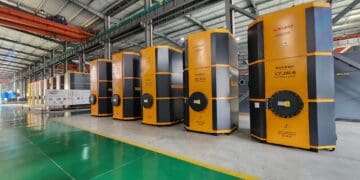As industries worldwide confront escalating gas prices and the pressing need to address climate change, a significant shift is underway towards adopting electric boilers. This transition, driven by both economic factors and corporate social responsibility (CSR) commitments, is redefining how industrial facilities and utilities approach energy production, steam generation, and process heating.
Recent surges in the price of natural gas — with NYMEX Henry Hub gas reaching nearly $6/MMBtu due to supply concerns — have made the economic case for electric boilers increasingly compelling. Beyond the financial aspects, the imperative to reduce carbon footprints and combat global warming is prompting companies to reevaluate their energy sources, with many managers and boards now opting for zero-emission electric steam and hot water boilers.
Robert Presser, Vice President of Acme Engineering, a company at the forefront of industrial and commercial boiler manufacturing, emphasizes the dual benefits of this transition. “Not only does switching to electric boilers offer an economically sound alternative, but it also aligns with the crucial CSR goals of reducing fossil fuel emissions and moving towards carbon neutrality,” Presser notes. This shift is in harmony with global efforts to combat climate change, including the targets set at the COP26 UN Climate Change Conference, which highlighted the need for accelerated decarbonization and the establishment of a global carbon market.
Electric boilers present a viable and efficient alternative to traditional gas or oil-fired units, debunking the myth that they cannot match the output of their fossil-fuel counterparts. Advances in electric boiler technology allow for the generation of significant amounts of steam in a compact footprint, with modern units like the CEJS High Voltage Electrode Steam Boiler by Acme offering capacities up to 52MW and efficiencies close to 99.9 percent. These boilers operate at existing distribution voltages and can produce substantial steam volumes, making them suitable for a wide range of industrial applications.
The advantages of electric boilers extend beyond their environmental and economic benefits. They are safer, easier to install, and require less operational oversight compared to gas-fired boilers, which pose risks of gas leaks and explosions. Electric boilers also offer superior control and precision in temperature adjustment, contributing to their operational efficiency.
Interest in electric boiler technology is not limited to industrial settings. Urban centers are increasingly exploring district heating solutions powered by electric boilers, providing a clean, efficient, and centralized heat source for residential and commercial buildings. In cities like New York, the potential for replacing gas-fired boilers with electric ones could significantly reduce emissions in densely populated areas.
The transition to electric boilers is a clear indicator of the broader move towards sustainability and responsible energy use in the industrial sector. As companies seek to align their operations with environmental goals and CSR initiatives, electric boiler technology offers a path to reduce emissions, lower operational costs, and contribute to a more sustainable future.
This shift not only represents a technological advancement but also underscores the role of corporate responsibility in addressing global environmental challenges. As industries continue to adapt, the adoption of electric boilers stands as a testament to the feasibility of achieving economic efficiency alongside environmental stewardship.
For more info, contact Robert Presser at Acme Engineering at e-mail: rpresser@acmeprod.com, phone: (518) 236-5659, or Web at acmeprod.com/high-voltage-electrode-steam-boiler
Stay updated with supply chain news at The Supply Chain Report. Learn more about international trade at ADAMftd.com with free tools.
#ElectricBoilers #SustainableEnergy #ClimateChange #CorporateSocialResponsibility #CarbonNeutrality #Decarbonization #ZeroEmission #SteamGeneration #AcmeEngineering #CleanTechnology #IndustrialInnovation #GasPrices #GreenEnergy #DistrictHeating #EnvironmentalStewardship #EnergyEfficiency














